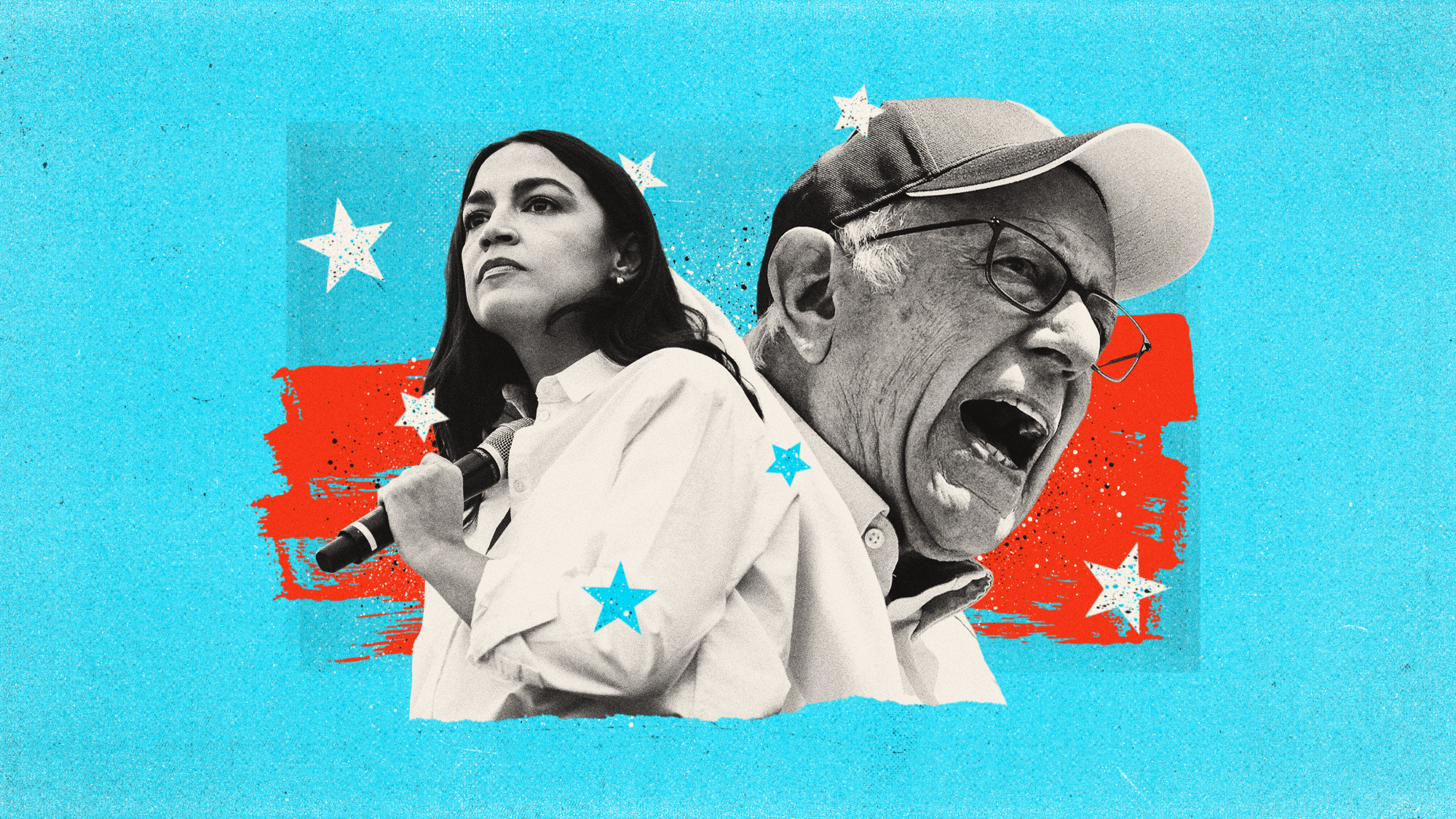Bernie Sanders' subtle warning to the Democratic Party
At the debate, Sanders laid down a marker for a contested convention


A free daily email with the biggest news stories of the day – and the best features from TheWeek.com
You are now subscribed
Your newsletter sign-up was successful
"Should the person with the most delegates at the end of this primary season be the nominee, even if they are short of a majority?"
That was the final question to the panelists at the Democratic debate in Las Vegas, and it was a very appropriate one — as appropriate as the question asked of the Republican candidates in 2016 about whether they would support whoever the nominee was in the general election. Only one candidate in 2016 refused to say yes — Donald Trump. Bernie Sanders was the outlier last night as well — he was the only candidate this time to say yes — and it matters for the same reason.
Cast your memory back to 2016. Why were Trump's rivals so reluctant for so long to attack him, when he was the frontrunner in the polls almost continuously from the moment he formally announced? One reason is that they knew he had a passionate following they didn't want to alienate — but Trump himself was in the best position to bring his supporters back into the fold if he lost. That's why Trump's refusal mattered. Trump was saying clearly that he had no loyalty to the Republican Party. If they attacked him frontally, he might attack the eventual nominee, or possibly even run as an independent, and thereby assure Hillary Clinton's victory. So they waited for his candidacy to deflate of its own accord. It wasn't until it was clear that was never going to happen that his surviving rivals proved willing to attack him, but by then it was too late.
The Week
Escape your echo chamber. Get the facts behind the news, plus analysis from multiple perspectives.

Sign up for The Week's Free Newsletters
From our morning news briefing to a weekly Good News Newsletter, get the best of The Week delivered directly to your inbox.
From our morning news briefing to a weekly Good News Newsletter, get the best of The Week delivered directly to your inbox.
That's why Sanders' answer mattered as well. The prospects of no one winning a majority of delegates — once widely underestimated — are now widely recognized to be quite high. (FiveThirtyEight's model estimates the odds at 40 percent, slightly more likely than an outright Sanders victory.) In that circumstance, the various candidates will come to Milwaukee with their pledged delegates in tow, and on the first ballot nobody will win the nomination.
That's when the horse-trading begins. On subsequent ballots, pledged delegates are no longer bound to vote for their pledged candidate. They will probably take their cues from that candidate about how to vote, though, which means other candidates can offer something of value — a VP slot, a place in the Cabinet, support for legislative priorities, or changes to the party platform — in exchange for their delegates' support. And they can also woo the so-called "superdelegates," party leaders who were never pledged to any candidate, and who cannot vote on the first ballot.
By this means, a minority candidate could theoretically become the nominee. Let's say Sanders comes to the convention with 40 percent of the pledged delegates, Mike Bloomberg has 30 percent, and Pete Buttigieg has 15 percent. Bloomberg could offer to make Buttigieg his VP, taking his delegate count to 45 percent, and then use his own fortune — promising jobs on his campaign, financial support for their candidacies, contributions to their non-profits — to win over enough super delegates to put him over the top. That's the nightmare scenario that my colleague, Damon Linker, sketched in his recent column about the Democratic Party's institutional weakness, and it's precisely the scenario that Sanders wanted to foreclose by answering that the plurality delegate winner should win the nomination, full stop.
Sanders has good self-interested reasons for taking his position; he is far more likely at this point to come into Milwaukee with a delegate plurality than any other candidate. But he's not by any means certain to do so. Consider the following alternative: Bloomberg comes into the convention with a delegate plurality of 32 percent, with Sanders at 30 percent, and some more conventional candidate — Biden, say, or Warren — at 25 percent. That's not an impossible scenario. Sanders might turn out to have a ceiling of support, and either Warren or Biden could parlay a better-than-expected showing in Nevada and/or South Carolina to a significant delegate haul on Super Tuesday. And states further along in the calendar — Georgia, Florida, Ohio, New York, Pennsylvania — may be easier territory for Bloomberg or Biden to beat Sanders on than either lopsidedly-liberal California or heavily-Hispanic Texas. In that case, would Sanders want the convention to be bound to give Bloomberg the nomination?
A free daily email with the biggest news stories of the day – and the best features from TheWeek.com
Perhaps he would; perhaps, in principle, he believes that the will of the voters should prevail. But in the second scenario sketched above, it's not at all clear that giving Bloomberg the nod would be respecting the will of the voters. The candidate with the most support may not be the ideal choice even of his own voters, merely the perceived best choice to defeat another loathed candidate. He could even be the candidate with the most opposition — indeed, he could be the absolute last choice of a majority under the right circumstances. If you want to find the candidate with the greatest consensus support, ranked choice voting is a much better (though still imperfect) method rather than simply giving the nod to the plurality winner.
That's not the system the Democrats have (and the difficulties in Iowa suggest that they shouldn't be trying to make voting more complicated any time soon). Instead, they've got a system where, if no candidate wins a majority, the party gets to decide.
So how should they decide? They have to consider which candidate would, in the abstract, have the best chance of winning in the general election, as well as helping down-ballot: who will best mobilize their side, who is least-likely to mobilize the other side, and who will win over the wavering middle. They also need to take seriously the possibility that failing to choose a particular candidate will alienate that candidate's supporters to the point that they don't vote or even defect in the general election — an especially likely prospect if that candidate actually was the plurality winner.
That's why Sanders' comment matters. What he's saying is: My people are not just going to vote for the Democrat if you deny me the nomination at the convention. And I'm not going to help you convince them to do so.
Is that what will actually happen? I suspect it depends on precisely which scenario comes true. If Sanders comes to the convention with a large plurality, clearly outdistancing the competition, I think the party would be insane to deny him the nomination. The damage they would incur by so doing far exceeds any possible risks of a Sanders candidacy.
But if the result is more muddled, the case will be more muddled as well. If Sanders limps into Milwaukee with a narrow and small plurality, having lost most of the late contests and polling poorly against Trump, and there is a clear compromise candidate with wide support within the party and decent general election numbers, then Sanders risks being perceived as a hostage taker if he persists with his current line and denounces the convention as undemocratic. And if Bloomberg earns a narrow plurality, I suspect even Sanders would change his tune and push for a compromise candidate rather than supporting the pledged delegate leader.
Right now, though, Sanders is laying down a marker to any candidates who are unlikely to accumulate a plurality of delegates. The longer the field stays big, the less likely it is that anyone gets a majority. If they can keep funding their candidacies, Biden, Warren, Klobuchar and Buttigieg could justify staying in even without hope of a plurality by saying that the convention could pick anyone and maybe they'll emerge as the compromise candidate. But the longer the field stays divided, the more likely it is that Sanders gets a plurality. So Sanders is warning them that if they stay in just to keep him from earning a majority, and then try to deny him the nomination, he'll tear the party apart. So at the point their chances of prevailing are over, they should get out.
And with Bloomberg in the race, he's laying down another marker as well: That if the billionaire tries to tip the nomination at the convention to himself, or to any other non-Sanders candidate, he'll attack that effort for being a flagrant corruption of the democratic process. Which is not how anyone who cares about defeating Trump wants to kick off the general election campaign.
Want more essential commentary and analysis like this delivered straight to your inbox? Sign up for The Week's "Today's best articles" newsletter here.
Noah Millman is a screenwriter and filmmaker, a political columnist and a critic. From 2012 through 2017 he was a senior editor and featured blogger at The American Conservative. His work has also appeared in The New York Times Book Review, Politico, USA Today, The New Republic, The Weekly Standard, Foreign Policy, Modern Age, First Things, and the Jewish Review of Books, among other publications. Noah lives in Brooklyn with his wife and son.
-
 Will increasing tensions with Iran boil over into war?
Will increasing tensions with Iran boil over into war?Today’s Big Question President Donald Trump has recently been threatening the country
-
 Corruption: The spy sheikh and the president
Corruption: The spy sheikh and the presidentFeature Trump is at the center of another scandal
-
 Putin’s shadow war
Putin’s shadow warFeature The Kremlin is waging a campaign of sabotage and subversion against Ukraine’s allies in the West
-
 The billionaires’ wealth tax: a catastrophe for California?
The billionaires’ wealth tax: a catastrophe for California?Talking Point Peter Thiel and Larry Page preparing to change state residency
-
 Mamdani vows big changes as New York’s new mayor
Mamdani vows big changes as New York’s new mayorSpeed Read
-
 Bari Weiss’ ‘60 Minutes’ scandal is about more than one report
Bari Weiss’ ‘60 Minutes’ scandal is about more than one reportIN THE SPOTLIGHT By blocking an approved segment on a controversial prison holding US deportees in El Salvador, the editor-in-chief of CBS News has become the main story
-
 Has Zohran Mamdani shown the Democrats how to win again?
Has Zohran Mamdani shown the Democrats how to win again?Today’s Big Question New York City mayoral election touted as victory for left-wing populists but moderate centrist wins elsewhere present more complex path for Democratic Party
-
 Millions turn out for anti-Trump ‘No Kings’ rallies
Millions turn out for anti-Trump ‘No Kings’ ralliesSpeed Read An estimated 7 million people participated, 2 million more than at the first ‘No Kings’ protest in June
-
 Ghislaine Maxwell: angling for a Trump pardon
Ghislaine Maxwell: angling for a Trump pardonTalking Point Convicted sex trafficker's testimony could shed new light on president's links to Jeffrey Epstein
-
 The last words and final moments of 40 presidents
The last words and final moments of 40 presidentsThe Explainer Some are eloquent quotes worthy of the holders of the highest office in the nation, and others... aren't
-
 The anger fueling the Bernie Sanders and Alexandria Ocasio-Cortez barnstorming tour
The anger fueling the Bernie Sanders and Alexandria Ocasio-Cortez barnstorming tourTalking Points The duo is drawing big anti-Trump crowds in red states
